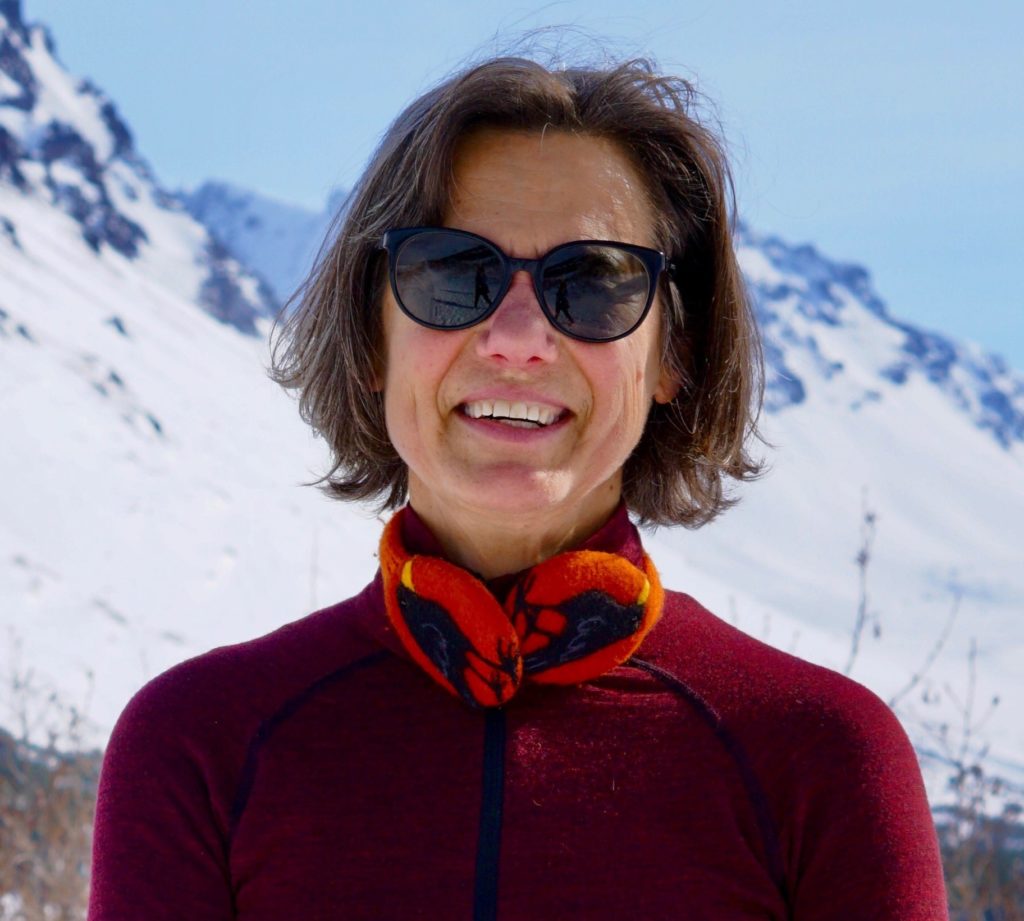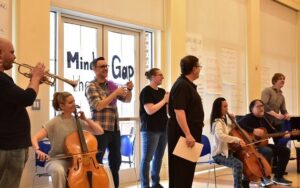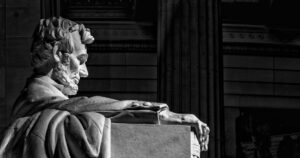As the crow flies, it’s almost 1,400 miles from Anchorage to the nearest point in the Lower 48 states. But for Betsy Baker, state liaison for Alaska, it feels as if the Braver Angels’ community is just around the corner.
“We would not be where we are without the support of the national organization,” she says. She cites the ongoing help of energetic Braver Angels who work far beyond their home regions – stalwarts such as the Pacific Northwest Regional Leads Carlos Hernandez from California and Will Clemmer from Washington (who has since handed the baton to Sharmin Banu), among many others.
Betsy, who lives in Anchorage and leans Blue, represents Braver Angels across a territory that’s bigger than Texas, California, and Montana combined. Alaska has only about 730,000 residents compared to 71 million across those three states.
To nobody’s surprise, then, there are no in-person gatherings of Braver Angels in Alaska. Nor is there a formal alliance. Not to mention the fact that Covid has recently been raging through the state. In addition, Braver Angels activity there is very new; it started during the first year of the pandemic. “Those factors have made it a challenge,” admits Betsy.
But Alaska also has Betsy and a tiny cohort of energetic, dedicated volunteers too. It needs them, because despite its seeming isolation from the rest of the country, Alaska wrestles with many of the same divisive issues that preoccupy so much of the American conversation.
The state adds its own distinct political and cultural issues for good measure, as with Alaska’s diverse educational landscape. The cultural traditions and standing of Alaska Natives – the region’s first peoples who comprise some 15% of the state’s population – play a key role in their advocacy for culturally appropriate education.
In addition, homeschooling is widespread because of Alaska’s dispersed population and limited road access. Homeschooling enjoys strong support from across the political spectrum and draws on excellent state resources and correspondence school models.
The first ever Alaska-sponsored Braver Angels debate held February 22, 2022, focused on education with this resolution: “Public schools in Alaska are focused too much on teaching what to think and not enough on teaching how to think.” The debate panel was carefully assembled from across the political spectrum and featured a state legislator, a recognized expert in home schooling, a rising-star Alaska Native educator, and a school board member. Paul Norris, a longtime Braver Angel based in northern California, moderated (“beautifully,” adds Betsy).
The seeds of that debate were sown at a November 2021 gathering on Zoom when volunteer Wendy Anderson shared that she and her husband had watched a few Braver Angels debates and thought the format could absolutely work in Alaska. The decision was made to organize “something for the New Year,” and with help from Braver Angels to the south – Janet Sedgley, a member of the organization’s National Debate Team from Oregon, and national event organizer Casey Jorgensen from Utah – the event took shape.
As the Red and Blue partners who planned the event, Wendy and Betsy could not have been happier with the outcome. The audience had a good Red-Blue balance and, as the evening concluded, the state legislator invited all of the panelists to continue the conversation in the months ahead, noting that it was the kind of respectful communication and listening to each other that is needed in Juneau, the state capitol. The Fairbanks Daily News-Miner featured the debate in a front-page story the day after, and KUAC, the local NPR affiliate, ran the first of two stories about Braver Angels in Alaska the day before.
But that success should not be taken to mean that there are only fair winds for Braver Angels in Alaska. The few events held to date have been one-offs rather than part of a strategic campaign; other than the 2020 screening of the original Braver Angels documentary, few have pulled big crowds. Linnea Ward – once Betsy’s Red coordinator counterpart and co-author on an op-ed about Braver Angels published in The Nome Nugget on July 4, 2020 – stepped down from that role after welcoming a new baby – and no one has volunteered to fill her shoes.
Add to that the realities of geography. The short summer in Alaska is a very busy time for almost everybody as they strive to take advantage of the long hours of sunlight before the return of winter’s shorter days. “Nobody in Alaska meets in the summer,” notes Betsy. “Any formal organization tends to say, ‘See you in the fall.’ ”
Which leaves Betsy, Wendy, and a precarious few to hold the Braver Angels banner high at the top of the United States. With Linnea on board in late 2020, Betsy had helped fire up monthly Zoom meetings – informal “get to know you” gatherings of up to 20 people. It seemed to be working; there was momentum with a core group of about 10, albeit almost all Blue.
But by last summer, the attendee numbers had dropped to just four or five. And now Betsy, a semi-retired international lawyer who specializes in ocean law and Arctic policy and was a director of a marine science funding organization, is considering stepping down as state coordinator unless another Braver Angel comes forward.
So perhaps it’s time for even more involvement by Lower 48 colleagues than the support that Betsy and Wendy and Linnea have already enjoyed – at least until there’s sustainable momentum.
And it’s definitely time for members in Alaska to volunteer. Even if it’s on a bite-sized, time-limited basis, or it’s to make a connection to reflect the national Braver Politics push or to bring Alaska Native voices into the organization… If that describes you, then please think how you can help depolarize not only at a national level but locally too.
That has to be worth it, yes? If you agree, and you’d like to talk, please contact Betsy at: bbaker@braverangels.org. She’ll be delighted to hear from you. As will everyone at Braver Angels!




